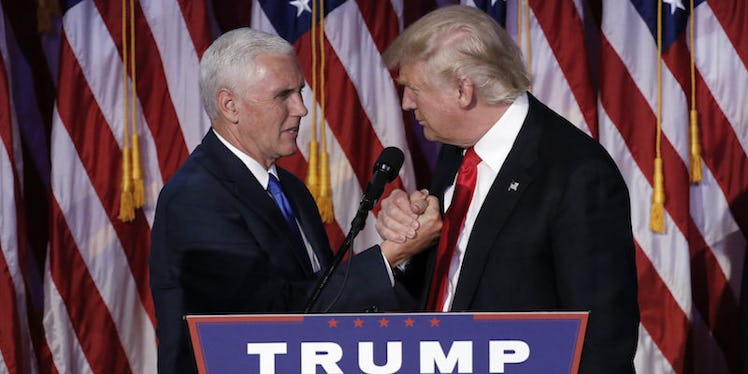
5 Reasons The LGBTQ+ Community Doesn't Trust A Trump Presidency
Nearly every single morsel of Donald Trump's campaign has been dissected to bits by the American public.
But one aspect of his platform we need to discuss further is his planned institutional violence against people in the LGBTQ+ community.
The violence isn't physical, though. Rather, it's the emotional and legislative violence written into our judicial and social systems that Trump plans to promote.
From speaking at anti-gay summits to supporting staunchly conservative Supreme Court Justice candidates, Trump would put harmful measures in place to maintain oppression based on sexuality and gender identity in America.
Here are five examples of how dangerous a Trump presidency would be to LGBTQ+ people:
1. He associates with several anti-LGBTQ+ organizations.
What he did:
Last month, he spoke at the Value Voter Summit, an annual conference hosted by the Family Research Council (FRC).
According to LGBTQ Nation, the notoriously anti-gay FRC supports “sodomy” bans and called same-sex marriage “a direct attack on the sanctity of marriage.”
Other organizations present have also called for the criminalization of homosexuality, like the American Family Association.
Make being gay illegal? Now there's the institutional violence we talked about.
What this means:
If Trump can befriend such severely bigoted groups, he likely wouldn't hesitate to put LGBTQ+ lives in danger for those friends.
2. He's considering 11 people to appoint to the Supreme Court: all white, all extremely conservative.
What he'll do:
He'll fill open Justice positions with vehemently conservative, non-diverse judges.
Furthermore, many of those considerations are willing to overturn Obergefell v. Hodges, the 2015 ruling in favor of the nationwide legality of same-sex marriage, according to ThinkProgress.
What this means:
With judicial, legislative and executive branches consisting of mainly white, Republican men, the country would halt much social progress for years — or even begin to reverse progress already made.
This would be detrimental to multiple disenfranchised groups, especially the LGBTQ+ community.
3. He pledges to sign an act permitting anti-LGBTQ+ discrimination on the basis of “religious freedom.”
What he did:
He promised to sign the First Amendment Defense Act, which allows freedom of religion to be a valid reason for business owners, healthcare providers, landlords and more to refuse service to LGBTQ+ individuals.
What this means:
Businesses and people could use religious freedom as an excuse to further the mistreatment and oppression of LGBTQ+ folks by denying them service, shelter or health care.
4. His running mate, Mike Pence, supports conversion therapy.
What he did:
According to an old post written by Mike Pence on his website, not only is Pence in favor of “institutions which provide assistance to those seeking to change their sexual behavior," but he also wants to take funding from HIV prevention organizations and give it to institutions offering conversion therapy.
Conversion therapy practices have been discredited and those supporting it called out for the false claims saying it can change a person's sexual orientation or gender identity.
What this means:
Fewer resources for the treatment of HIV would be available, which disproportionately affects the LGBTQ+ community.
Also, pressure to attend emotionally scarring and abusive conversion therapy programs would increase for the LGBTQ+ population.
5. He supports the highly transphobic “bathroom bill.”
What he did:
He endorsed HB2, the North Carolina bill banning transgender individuals from using the bathroom of their choosing, despite panning it earlier this year, according to The Huffington Post.
What this means:
Safety and comfort for trans people — or anyone who doesn't “look” like the gender they are — would reach an all-time low.
When a political campaign uses fear and stereotypes to garner public approval and incite fear of minorities and oppressed peoples, it hurts us as a democracy.
Trump's alleged sexism and xenophobia have been heavily reported by the media, but the dangers of his policies and affiliations toward LGBTQ+ people trail behind in coverage, which is why they're so important to talk about.
After all, we all deserve respect and representation from our political leaders. No one should feel like their country works against them.